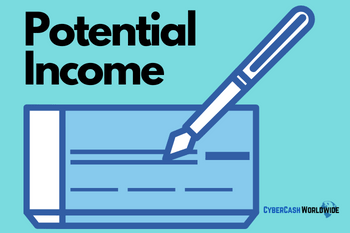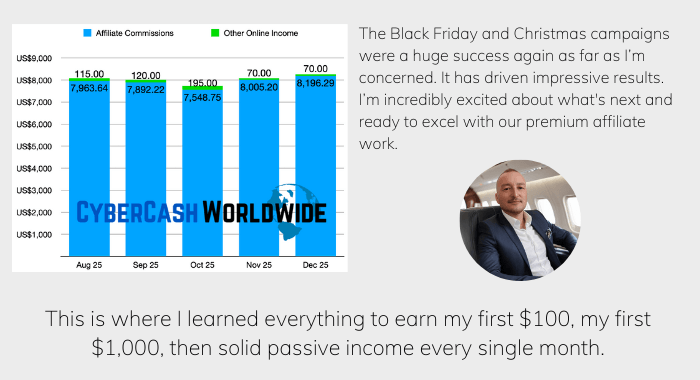There are many "systems" that claim to generate a lot of money for you in a short period but say they're not "Get Rich Quick" schemes. In my opinion, they're just arguing over the terminology. If they are promising an unrealistic level of income, then it is a get-rich-quick scheme, isn't it? If you know how to spot a few simple signs of online scams, it's not too difficult to judge whether a make-money-online product is genuine or not. Often, training programs offer a free sign-up but with limited access and require you to either pay a one-off charge or start paying the recurring monthly fee to continue your membership. At what point will you know if it's legit or scam?
The scheme/program is legitimate if what you get is worth the money, and it's a scam if it's not. However, it often gets difficult to judge once you start listening to the seller's smooth talk. They say that you can 'potentially' earn five figures every month. You're not making money yet, maybe because you're not doing it right... They often offer special training to 'enhance' your income level, but you'd have to pay extra for it.

How To Spot Online Scam - 10 Useful Tips
Years ago when I started out, I indeed got trapped by these scammers a few times, lost a few hundred dollars to them, but learned a good lesson each time. So I believe the money was well-spent in that respect..for my own naiveness & stupidity. I don't want you to make the same mistake and, I'm pleased to say if you know what to look out for, it's actually not difficult to spot a scam.
So here is a list of 10 points that you should remember before joining any money-making program.
1. The Phrase "Quick And Easy"
Many product sellers have good copywriting skills enough to fool you. If something sounds too good to be true, it almost definitely is, as far as "make money online" products are concerned.
When you see or hear the word "quick" or "easy", what are they actually referring to?
If they're talking about a specific part of it - such as a particular signup process is "easy" or the approval process is "quick", then it makes sense, doesn't it.
But the moment someone says the whole system - making money - is easy, I would drop all the trust in that person.
Words such as quick and easy are subjective adjectives. Becoming an astronaut is quick and easy for a small group of people for sure. They should be careful about using those words unless they have a valid explanation in a way that anyone can understand.
Where there's something that anyone can do, there's very little value in it. So if they're actually saying these words, I would cast a big question mark.
2. No Free Trial
Of course, no free trial doesn't mean a scam, not at all. But when it comes to a digital product such as a training program or membership scheme, it can be very difficult to know if it's worth the money before you make a purchase. It's hard to make your own judgment sometimes.
I think - from a buyer's point of view - there should offer at least a few days of free trials, so users can check out the menu to see what's available and get an idea of what it offers.
Some sellers charge you as small as a "$1 trial fee" for using their information product for the first few days and, if you don't cancel your trial membership within the period, your credit card will be automatically charged with a full monthly recurring fee.
From a seller's perspective, it may seem fair. Because they're letting you use their platform for a short period, they want to charge you at least a minimal fee. Also there are so many freebie abusers around, who only look for free stuff online one after another and do nothing. Sellers may want to do anything to avoid abusers.
But that's their problem. If they are 100% confident with the product they sell, they should be comfortable letting you use it for free with limited access.
As I said, not offering a free trial does not mean the product is a scam, but it may show a lack of transparency, perhaps a lack of confidence in the seller.
3. Heavily and Inadequately Focused on "Potential Income"
Check the sales page - read the sales copy carefully or, if there's a sales video, listen to what the seller's saying. How much time do they spend telling you about the potential income?
- "I've made $50,000 in the first 4 weeks. You can too..."
- "Imagine you receive $60,000 by next month, it will allow you to buy...(car, holiday, whatever luxury)"

Make-money-online / work-from-home products aim to let you create maximum wealth, but that's just the ultimate goal, isn't it? What's much more important at this stage is whether the method it introduces is viable to you or not.
These figures may help you get an idea of your future potential income, but if a sales page is almost entirely focused on the numbers, it's likely to be fake.
"Look at the check I recently received!"
If they present you with a copy of a check, I wouldn't trust them either. A bank check? Why can't they do a wire transfer? It's not 2010!
4. The Owner's Identity Is Hidden
Now, would you trust anything sold anonymously? I wouldn't.
I get so many invitations/sales emails from Gmail users who claim to be designers, advertising agents, SEO experts...and so on, but they never show proof of identity such as a link to their LinkedIn account.
No matter how professional they may sound, I don't trust a word they say.
When it comes to buying a product, it's important that you make sure the seller is real. Ideally, they should be recognized as an expert in their field already. If a scheme is to sell health food products, the owner may be a qualified nutritionist or at least have years of similar experiences.
But if they're not, the least they can do is to show who they are. Google the seller's name to check if they come up. Fake sellers often use a common name (e.g. Sarah Brown, Jack Williams) So you may want to google the seller's name + the product name, or the seller's name + their title.
Their photo should be on the site, but that can be fake too. If they look "unrealistically good", then use a reverse-image search site such as;
The seller's face in the photo may turn out to be just a stock photo model.
5. Owner's "Life Transformation Tale" Is Irrelevant
What you need to know is the owner's experience and level of expertise. Imagine you are a job interviewer, and a candidate starts talking about their dramatic life-turnaround tale;
"3 years ago I went through a horrific divorce, the wife took everything and I was left with nothing. Then I found this method and look at me now, I'm a multi-millionaire."
You wouldn't take any of the candidate's stories into account for the selection process, would you? Unless he shows HOW he turned his life around - his skills and willpower. The secret behind the turnaround.
Make-money-online scheme sellers often go on & on about emotional events they experienced in the past - such as a death of a family member or the poverty they suffered as a child. It doesn't matter if such a story is true or fabricated. Always stop and think if the story you just heard is relevant to the actual product.
Emotional blackmail doesn't necessarily mean the product itself is a scam fake, but the more dramatic the story, the more suspicious you should be!
6. If You Are "Qualified To Join"

If there is an entry test to join the scheme - forget it! You are paying your money. You are NOT lucky if you pass the test.
What I mean is that some sales pages are in Q&A format. They may be genuinely asking about your circumstances such as experience level, financial situation, etc. It's none of their business at this point, you know.
Particularly, you should be warned when you are asked to answer a few questions and what you see on the next screen reads like this;
"Congratulations! You've passed the test to become our privileged member".
Don't believe any of it. Don't let them make you feel like you are one of the lucky few. It's all fake.
7. Membership Has Limited Availability - Fake Scarcity
Legitimate sellers, brands, and retailers often use scarcity marketing techniques. They give you a discount time slot, display a timer on the site, and usually when the timer goes down to zero, their discount offer ends. But scammers use some fake scarcity copies such as;
- "Due to its enormous popularity", there are only 6 slots left. Or
- The entry will have to be closed in the next few days.
They are digital products, there are no 'slots' or an entry limit. Check the site in a week's time and there'll still be 6 slots left and the door will still be closed in the "next few days".
8. Fake Video Testimonials
For a seller, it's crucial to display testimonials from their existing users. But some testimonials have no quality, they don't always do justice. For example, a user on a lengthy video testimonial repeatedly thanking the scheme, how grateful they are, life-changing and all. They're actually wasting the viewers' time, aren't they?
What's worse is that anyone can actually pay someone from a marketplace such as Fiverr to record a video testimonial for as little as $5-$10.

Fake Testimonials used for "AZ Sniper"
You could find out if a testimonial contributor is real or fake sometimes - by checking Fiverr, or from the way they talk (i.e. like actors). But otherwise, I would focus on the actual content of a testimonial, such as;
- What they think makes the product/scheme different from others.
- HOW it helped them and helped WHAT specifically.
Taking a memo as you watch a video testimonial is a good idea. It may help you find out whether the contributor says something valuable or not. If they're simply repeating how awesome it is, the product may just be a cheap trick.
9. Long Money-Back Guarantee

A money-back guarantee period is usually 7 days, 14 days, 30 days, or perhaps as long as 60 days. It might depend on the nature of the digital product and also depend on how much time you can spend trying out the product each day. But if you are really unhappy with it, you should be able to make up your mind whether to ask for a refund within a reasonably short period, shouldn't you?
If you see a guarantee period that's as long as 90 days, it may be worth taking some precautions - because it's too long. The seller may be waiting for you to forget about it.
Despite regretting purchasing it, you stay on the fence because you know you still have 3 months to decide whether to claim a refund or not. But in such a long timeframe, your motivation to claim can fade.
Some training tutors offer a 'conditional' 90-day money-back guarantee - on the condition that you send them proof that you've followed the method for 90 consecutive days and appeal that it hasn't worked. I think that kind of policy is spiteful.
They don't want users to abuse the guarantee policy, yes, understand. What I think the tutors need is to build trust and become invincible. If their training product is such good quality and the tutor is trustworthy, students should be happy to spend money on them.
10. Notorious "Administration Fee"
Talking about a refund policy, I'd be reluctant to call it legitimate when they offer a 100% money back guarantee but sneakily deduct an administration charge from the refund. If it's their policy, it is what it is. But from a customer's point of view, that's not 100% money-back. It should be clarified. Not in tiny writings on the separate "terms of use" page.
Especially if the administration charge is hefty. You ask for a $100 refund that you've paid, and the admin charge is $40, that's an online scam, as far as buyers are concerned.
In fact, there shouldn't be charging an administration fee at all. When you go shopping, where on earth would you pay an administration fee? Nowhere. Every business involves admin work, and the cost is incorporated into the product that they sell. Part of the price of coffee is the admin fee, you see what I mean?
11. Read Other Reviews!
Last but not least, and the simplest solution to spot online scams. Google search the name of the program and see what others say. Read fairly recent ones, because over the years the program may improve or worsen, the payment term or policy may change and its reputation changes accordingly.
And perhaps more importantly, read several of them. Because the majority of positive reviews are written by the affiliates, they are only telling you the good news in order to make commissions. It's important to find out the negatives.
My #1 Recommendation
My No. 1 recommendation is Wealthy Affiliate because;
- It never promises you to make money quick & easy. It tells you that you need to work hard on it, and it will take time before you can start earning income.
- You don't have to become a premium (paid) member, although you'll get a lot of benefit from it. You can stay free as long as you like.
- Its program is not focused on how much you can earn, let alone indicates unrealistic figures. It is about learning to become an online business entrepreneur.
- The owner identity is clear - Kyle and Carson as co-founder since 2005.
- No Life Transformation Tale!
- Anyone can join - no ridiculous test to entry.
- Unlimited members network - over 500,000 members worldwide.
- No fake video testimonials, but hundreds of video tutorials, covering all areas necessary for online businesses - designs, technical advices, marketing, latest trends and social media.
- Free membership. Once you become a premium member, no money-back for that month. You can cancel any time. There's no contract.
- Try reading other reviews - you really don't find any bad reviews!
Click the banner below to check how you can go about - any questions, don't hesitate to leave a comment below. Good luck!


Specialists from the Department of Security informed you that the costs had been placed and that the cargo charges had been paid, with the exception of $160500. Then, the anonymous professed to have been moved to gather the magnate for your sake. Kindly affirm this? Is the Ccc and security keeping figure something you requested him to pay for? Furthermore, I am illuminating you that an arrangement was reached with the US customs specialists at JFK field that you should shoot the figure at the rearmost toward the beginning of today, any other way, your funds will be given over to him and you will be captured for doling out him without our assent.
I anticipate hearing back from you at the earliest opportunity.
Hi Ray, thank you for the useful article. I’m intrigued by some points, particularly about the long money back guarantee period. I thought the longer the better, the idea of sellers expecting buyers to forget over time was eye opening. But I’m not so sure about conditional 90 day moneyback guarantee. Some sellers must be struggling to deal with too many refunds. On Trustpilot, I see many criticisms about sellers refusing to refund, making me think there are two sides to every story. Thank you for sharing your advice.
Regards
Clair
Hi Clair, thanks for your comment. Yes, I agree with you about sellers struggling to avoid refunds. However, some conditional refund policies require tasks that seem impossible to achieve, they practically tell you not to claim a refund. It doesn’t mean they are scammers but I feel that they’re being unreasonable sometimes. Thanks Clair, I appreciate your comment.
Thank you for your information. I will try this as soon as possible…
I tried to make money since 3 years ago but it is difficult. Thank you for sharing it.
Hey, I’ve been conned by someone who had fake video testimonials made in the past. 2 people were saying this organic protein powder was powerful. I cannot remember how much I paid but well over $100. It didn’t work and it made my stomach upset badly. Later on I discovered these 2 people on the video were working together with the man who sold the powder. He disappeared a few weeks later. Luckily I claimed my money back from my credit card company. Best regards Norton
Hi Norton, sorry to hear about your experience in the past. I’m assuming it was advertised via social media or some sort of free platform? As I said in the post, I wouldn’t really trust a video testimonial if there was no original content, if they’re only saying “this is a great product! I love it!” rather than explaining why they actually recommend it to other users. Good you got your money back though. Thanks for sharing.